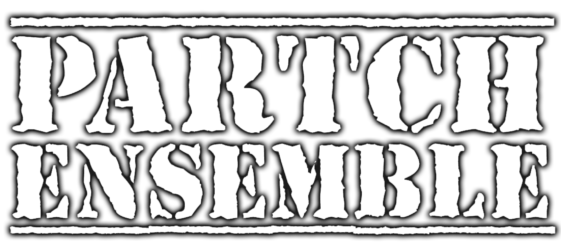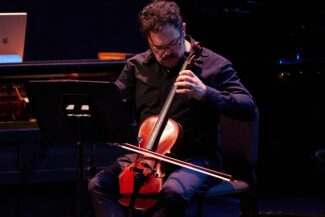Recreation of a instrument designed by Harry Partch in 1930
Videos with Adapted Viola
-
Three Dances (1952) by Harry Partch
Notes
1. Samba—A DECENT AND HONORABLE MISTAKE
2. Heartbeat Rhythm—RHYTHM OF THE WOMB–MELODY OF THE GRAVE
3. Afro-Chinese Minuet—HAPPY BIRTHDAY TO YOU!We begin this evening’s concert with the Three Dances that begin the third section of Partch’s Plectra & Percussion Dances (1952). The composer warned, “It’s an amazing fact that the world of dance music, and of Latin American dance music particularly, has produced an army of purists that is equal of anything that serious classical music can offer. I say this in order to advise you that the first scene, for example, “A Decent and Honorable Mistake,” may not be recognizable to you as a samba. The second scene, “Rhythm of the Womb, Melody of the Grave,” is based on a rhythmically contrapuntal heartbeat. The third scene, “Happy Birthday to You!” begins with an African-sounding marimba and somehow gets involved with a Chinese- sounding guitar in a pentatonic melody, and so I call it an Afro-Chinese Minuet.” This last dance ends with these directions: “Slowly enough that canon TRIADS are distinct,” after which they are to be played “faster than the previous runs so that the triads are NOT distinct.” The harmonies of each of those descending triads are wildly divergent, as if the composer is pausing to reminisce about various years past, but finally admits that as a 51-year old they are, in fact, a blur.
Partch Instruments:
Adapted Guitar III, Adapted Viola, Bass Marimba, Chromelodeon, Cloud Chamber Bowls, Diamond Marimba, Harmonic Canon, Kithara, Marimba EroicaAdditional Instruments:
Percussion -
Amateur California Prune Picker (2022) — by Kyle Gann
Notes
Live at REDCAT, June 16-17, 2023
Program note by Kyle Gann:
As a long-time microtonalist, I’ve always wanted to write something for the Harry Partch instruments, so I am extremely grateful to John Schneider for offering me the chance. My idea was to prove, or perhaps I should say test, the universality of Partch’s ensemble by trying to write in a style that didn’t sound like Partch. Accordingly, I concentrated on the microtonal relationships among the various harmonies, and had to wrestle with the fact that not all of his instruments had the same pitches. After fifty years of composing, I was made to feel like a rank amateur in this totally idiosyncratic environment, and as Partch inveighed against his performers looking like an “amateur California prune picker,” I thought I should embrace the title. Were I to attempt a second essay, I would probably surrender and write “à la Harry.” — K.G.
Partch Instruments:
Adapted Viola, Bass Marimba, Chromelodeon, Cloud Chamber Bowls, Diamond Marimba, Gourd Tree, Spoils of War -
feel of the needle when at last you pull the needle through it (remote presentation)
Notes
A year ago I read The Emissary by Yoko Tawada, which inspired me to propose to her a musical theater adaptation of it. Having her consent, I conceptualized it for the PARTCH Ensemble and immersed myself in the subtleties of things Partch and Japanese—both surprisingly complementary in ways well expressed by the haiku of Santoka Taneda, used here as my title.
-
Dark Brother
Notes
Music by Harry Partch (1901-1974)
Final two paragraph’s of Thomas Wolfe’s “God’s Lonely Man.”Performers:
Alison Bjorkedal – Kithara I
Vicki Ray – Chromolodeon
Derek Stein – Adapted Viola
T.J. Troy – Bass Marimba and Voice
Video captured and edited by Video Angel Productions
Audio recorded by Chris VotekPresented by Jacaranda Music Series, First Presbyterian Church, Santa Monica, CA, November 9, 2019.


